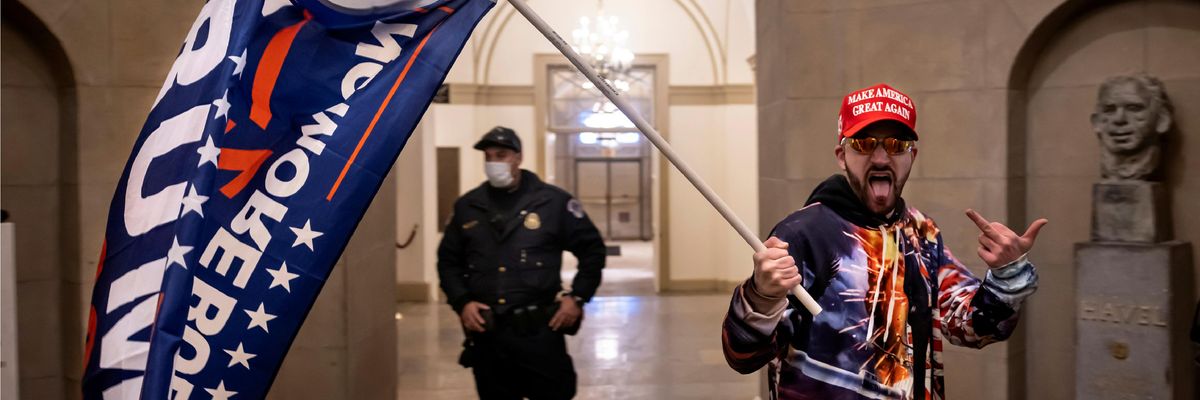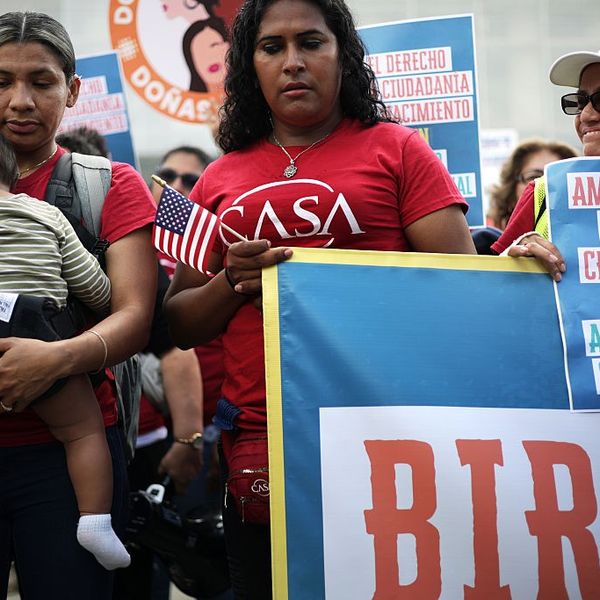
A supporter of former President Donald Trump inside the U.S. Capitol Building on January 6, 2021, in Washington, DC.
Trump Led an Insurrection and a Court Is Right to Bar Him Under the 14th Amendment
The decision by the Colorado Supreme Court is likely to be overruled by the U.S. Supreme Court, but it's significant nonetheless.
As I have argued on this page, Trump shouldn’t be allowed on any ballot because Section 3 of the 14th Amendment prohibits anyone who has held public office and taken an oath to protect the Constitution from holding office again if they “have engaged in insurrection” against the United States.
This key provision was enacted after the Civil War to prevent those who rose up against our democracy from ever being allowed to hold office again.
This applies to Donald Trump. He cannot again be entrusted with public office. He led an insurrection.
On Tuesday, the Colorado Supreme Court agreed, ordering the Colorado secretary of state to exclude Trump from the state’s Republican primary ballot.
Here is what the Colorado Supreme Court said:
“A majority of the court holds that President Trump is disqualified from holding the office of president under Section Three of the Fourteenth Amendment to the United States Constitution. Because he is disqualified, it would be a wrongful act under the Election Code for the Colorado Secretary of State to list him as a candidate on the presidential primary ballot. …
We do not reach these conclusions lightly. We are mindful of the magnitude and weight of the questions now before us. We are likewise mindful of our solemn duty to apply the law, without fear or favor, and without being swayed by public reaction to the decisions that the law mandates we reach.”
Trump will appeal this ruling to the Supreme Court. If Clarence Thomas recuses himself — as he should, and as the court’s new code of ethics makes clear he must (although with no mechanism to enforce it, it’s bogus) — there is a narrow possibility that the court will affirm the Colorado ruling, in which case Trump cannot be on any state’s ballot.
Given the composition of the court — and Trump’s three appointees — this outcome seems very doubtful.
Nonetheless, the Colorado ruling is significant. It gives the American public a clear and unambiguous argument that Donald J. Trump’s third run for the presidency defies the U.S. Constitution.
An Urgent Message From Our Co-Founder
Dear Common Dreams reader, The U.S. is on a fast track to authoritarianism like nothing I've ever seen. Meanwhile, corporate news outlets are utterly capitulating to Trump, twisting their coverage to avoid drawing his ire while lining up to stuff cash in his pockets. That's why I believe that Common Dreams is doing the best and most consequential reporting that we've ever done. Our small but mighty team is a progressive reporting powerhouse, covering the news every day that the corporate media never will. Our mission has always been simple: To inform. To inspire. And to ignite change for the common good. Now here's the key piece that I want all our readers to understand: None of this would be possible without your financial support. That's not just some fundraising cliche. It's the absolute and literal truth. We don't accept corporate advertising and never will. We don't have a paywall because we don't think people should be blocked from critical news based on their ability to pay. Everything we do is funded by the donations of readers like you. Will you donate now to help power the nonprofit, independent reporting of Common Dreams? Thank you for being a vital member of our community. Together, we can keep independent journalism alive when it’s needed most. - Craig Brown, Co-founder |
As I have argued on this page, Trump shouldn’t be allowed on any ballot because Section 3 of the 14th Amendment prohibits anyone who has held public office and taken an oath to protect the Constitution from holding office again if they “have engaged in insurrection” against the United States.
This key provision was enacted after the Civil War to prevent those who rose up against our democracy from ever being allowed to hold office again.
This applies to Donald Trump. He cannot again be entrusted with public office. He led an insurrection.
On Tuesday, the Colorado Supreme Court agreed, ordering the Colorado secretary of state to exclude Trump from the state’s Republican primary ballot.
Here is what the Colorado Supreme Court said:
“A majority of the court holds that President Trump is disqualified from holding the office of president under Section Three of the Fourteenth Amendment to the United States Constitution. Because he is disqualified, it would be a wrongful act under the Election Code for the Colorado Secretary of State to list him as a candidate on the presidential primary ballot. …
We do not reach these conclusions lightly. We are mindful of the magnitude and weight of the questions now before us. We are likewise mindful of our solemn duty to apply the law, without fear or favor, and without being swayed by public reaction to the decisions that the law mandates we reach.”
Trump will appeal this ruling to the Supreme Court. If Clarence Thomas recuses himself — as he should, and as the court’s new code of ethics makes clear he must (although with no mechanism to enforce it, it’s bogus) — there is a narrow possibility that the court will affirm the Colorado ruling, in which case Trump cannot be on any state’s ballot.
Given the composition of the court — and Trump’s three appointees — this outcome seems very doubtful.
Nonetheless, the Colorado ruling is significant. It gives the American public a clear and unambiguous argument that Donald J. Trump’s third run for the presidency defies the U.S. Constitution.
- 'Trump Is Disqualified': Activists Aim to Keep Insurrectionist Off Ballot in Key States ›
- Conservative Legal Scholars Argue Trump Is Disqualified for Office Under 14th Amendment ›
- Colorado Judge Says Trump 'Incited' Jan 6 Attack—But Keeps Him on Ballot ›
- Opinion | The Right-Wing Supreme Court Will Save Donald J. Trump Just Like It Saved George W. Bush | Common Dreams ›
- Judge Disqualifies Trump From Illinois Ballot, Citing Jan 6 Role ›
As I have argued on this page, Trump shouldn’t be allowed on any ballot because Section 3 of the 14th Amendment prohibits anyone who has held public office and taken an oath to protect the Constitution from holding office again if they “have engaged in insurrection” against the United States.
This key provision was enacted after the Civil War to prevent those who rose up against our democracy from ever being allowed to hold office again.
This applies to Donald Trump. He cannot again be entrusted with public office. He led an insurrection.
On Tuesday, the Colorado Supreme Court agreed, ordering the Colorado secretary of state to exclude Trump from the state’s Republican primary ballot.
Here is what the Colorado Supreme Court said:
“A majority of the court holds that President Trump is disqualified from holding the office of president under Section Three of the Fourteenth Amendment to the United States Constitution. Because he is disqualified, it would be a wrongful act under the Election Code for the Colorado Secretary of State to list him as a candidate on the presidential primary ballot. …
We do not reach these conclusions lightly. We are mindful of the magnitude and weight of the questions now before us. We are likewise mindful of our solemn duty to apply the law, without fear or favor, and without being swayed by public reaction to the decisions that the law mandates we reach.”
Trump will appeal this ruling to the Supreme Court. If Clarence Thomas recuses himself — as he should, and as the court’s new code of ethics makes clear he must (although with no mechanism to enforce it, it’s bogus) — there is a narrow possibility that the court will affirm the Colorado ruling, in which case Trump cannot be on any state’s ballot.
Given the composition of the court — and Trump’s three appointees — this outcome seems very doubtful.
Nonetheless, the Colorado ruling is significant. It gives the American public a clear and unambiguous argument that Donald J. Trump’s third run for the presidency defies the U.S. Constitution.
- 'Trump Is Disqualified': Activists Aim to Keep Insurrectionist Off Ballot in Key States ›
- Conservative Legal Scholars Argue Trump Is Disqualified for Office Under 14th Amendment ›
- Colorado Judge Says Trump 'Incited' Jan 6 Attack—But Keeps Him on Ballot ›
- Opinion | The Right-Wing Supreme Court Will Save Donald J. Trump Just Like It Saved George W. Bush | Common Dreams ›
- Judge Disqualifies Trump From Illinois Ballot, Citing Jan 6 Role ›

